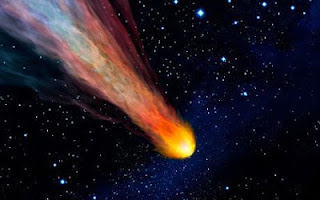 |
| What a pretty ball of fiery destruction! |
by Jonathan Harrison
Do
you remember when a meteor blew up over Russia, and it was crazy? I do. Granted,
the meteor exploded almost a month ago, but in a fast paced world where the
news runs 24/7, we tend to have a short memory for anything that doesn't
involve politics. "What do you think about the sequester," tends to elicit
more responses than "What you think about the ten-ton meteor that blew up
over Russia?" Doesn't something seem a little wrong with that
statement?
Scientists repeatedly tell
us that we're in the middle of a cosmic shooting gallery, and yet 99% of people
never reflect on our inter-stellar vulnerability; otherwise we would do
something to avoid being caught off guard by massive rocks from space slamming
into the Earth.
For many Christians, if you were to ask them about the chances
of a meteor destroying the world, their repeated refrain would be, "If God
wants it to happen, then it will happen," which I find delightfully
ironic, since this implies that God's providence is inversely proportional to
the amount of control we wield in a particular arena.
For
example, let’s imagine you move into a friend's house, and you discover they
leave the front door wide open at night. You ask them why, and they respond,
"God is in control. If God wants us to get robbed, then we’ll get robbed."
Now imagine that when he left the door open, instead of someone robbing your
house, the consequences included the destruction of the entire world. And
imagine that, despite this fact, your friend remains headstrong about leaving
the front door wide open.
 |
| Meteor that hit Chelyabinsk, Russia |
And
there you have my point.
Mixed-metaphors
aside, God’s providence doesn't typically prevent burglars from passing through
open doors, so why does God being in control suddenly protect us from
Texas-sized meteors? The human race should view Chelyabinsk as a wakeup call, but unfortunately humanity
fell back asleep five seconds after the alarm went off. A ten-ton meteor blew
up over the earth. We have videos to prove it. Yet we don't care enough to do
anything about it, despite the fact that the potential negative consequences
mean the destruction of the human race.
Am I
saying that we should have less faith? No, but if we
believe that we are called to “be fruitful and multiply,” tracking meteors in
order to deal with the threat they pose seems a valid enterprise. What I am
saying is this: maybe my problem isn't with the meteors, but with how we view providence.
On some level, it's nice when people say, "God is in control when it comes
to ten-ton space rocks,” but if they’re going to rely on God’s providence in
this instance, I prefer them to be consistent. I’d rather people take that viewpoint
towards everything (even toward the question of locking their doors at night),
than choosing piece-meal what's within God's control and what's not. Either God
controls the ten-ton space rocks and
the the security of your front door, or he doesn't. You can't pick and
choose.
So the next time a crazy guy like me talks your ear off about meteors for twenty minutes, take just a moment, and think deeply before you choose to reply, "If it happens, it happens." Because he might just ask you, "Shouldn't you feel that way about everything?"
Jonathan Harrison is currently sitting in the meteor-proof bunker he dug in
his back yard. He's wearing a tin-foil hat and believes that Facebook is
a government conspiracy to have the docile masses voluntarily turn over all of
their personal information (which is pretty genius if you think about it).
You can find him on Twitter at @jonateharrison.
You can also follow On
Pop Theology on Twitter @OnPopTheology
or like us on Facebook at www.facebook.com/OnPopTheology.

No comments:
Post a Comment